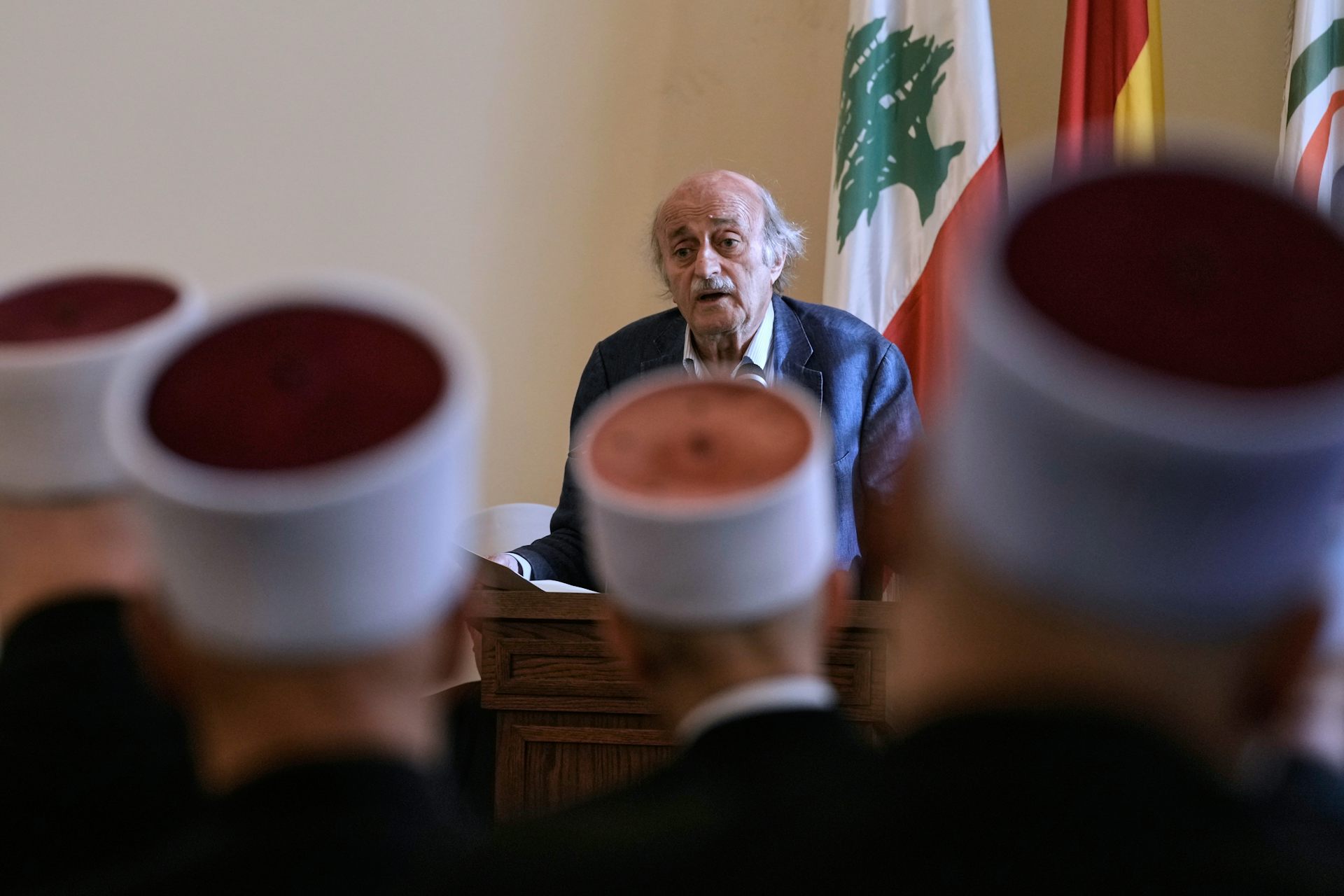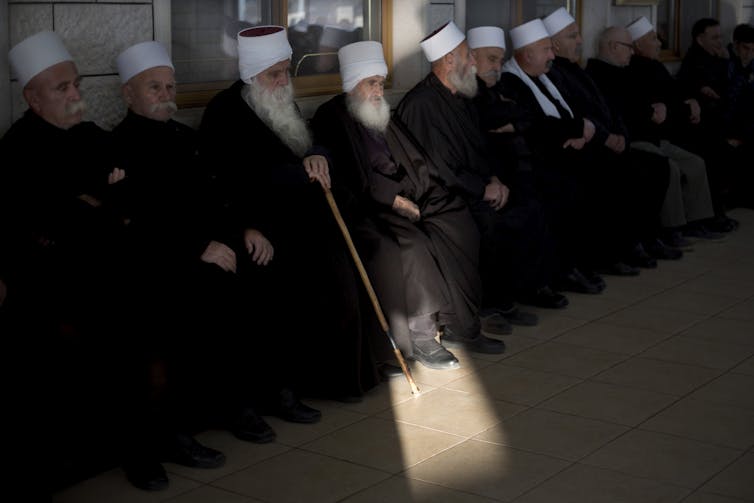The Druze are a tightly knit community – and the violence in Syria is triggering fears in Lebanon

(The Conversation) — Violence continues several weeks after clashes started between armed Bedouin clans, Sunni jihadist groups and Druze fighters on July 14, 2025, in Sweida, a city in southern Syria.
Hundreds of Druze were killed in the clashes, and Syria’s defense minister deployed forces to contain the sectarian fighting.
The Druze are a religious minority in the Levant, the region covering roughly modern-day Syria, Lebanon, Jordan, Israel and Palestinian territories. The faith originated in Egypt as an offshoot of the Fatimid tradition, a branch of Shiite Islam. Today, there are about 1 million to 1.5 million Druze worldwide, more than half of whom live in Syria. Most others live in Lebanon, Israel, Jordan and the Israeli-occupied Golan Heights.
We are experts in Druze and Lebanese history, and we know that the conflict in Sweida is regarded by the Druze of Lebanon – and the Druze everywhere – as a deeply personal matter.
What’s more, the horror stories coming out of Sweida are reverberating in Lebanon, where many Druze also fear the risk of sectarian violence, and distrust in current leadership.
Bonds forged through a long history
Many scholars attribute the strong bond between the Druze of Syria and Lebanon to their shared faith – which is partly true – but they often overlook an equally vital element: a collective conscience shaped by a distinctive origin story.
The Druze see themselves as an ancient, blood-related tribal coalition that evolved into an extended family spread across regions. This self-perception is so deeply rooted that it gave rise to a well-known Levantine saying: “The Druze are like a copper plate – wherever you strike it, it rings.”
According to local tradition, several Druze families from Mount Lebanon migrated to the Hawran region, south of Damascus, more than three centuries ago, paving the way for thousands of others to follow. Sweida is the capital city of the Druze region in Ḥawran. The region of Ḥawran is the second-youngest Druze settlement – after Jordan – dating back to the 18th century.
A foundational event in the community’s modern history was the Druze uprising in Ḥawran against the Ottoman governor of Egypt, Muhammad Ali Pasha, in 1837.
The governor had insisted on imposing conscription and disarmament on the Druze. The community rebelled since both measures would put their security and autonomy at risk, and the governor sent the army to occupy the Levant.
During the revolt, Druze from Mount Lebanon and Wadi al-Taym – a historical Druze region encompassing the modern-day Lebanese districts of Rashayya and Hasbayya in the southeast, near the Syrian border – rose up to divert the Egyptian army and sent fighters to support their Syrian kin.
In 1838, many of these Lebanese fighters were killed, particularly in what is known as the Battle of Wadi Bakka, near the Lebanese-Syrian border; an entire Druze battalion was besieged by the Egyptian forces and nearly wiped out.
In 1860, a third civil war involving the Druze under the Ottomans broke out in Mount Lebanon between the Druze and the Maronites. The Maronites are a group of Eastern Catholic Christians predominantly in Lebanon. The conflict centered on control of the southern regions of the mountain – historically known as the Druze Country.
As violence escalated between the two communities, the Druze of Ḥawran came to the aid of their fellow Druze in Mount Lebanon, tipping the balance in their favor.
During World War I, Mount Lebanon was hit by a famine and around 200,000 people died. The Druze of Ḥawran supported the Druze in Lebanon by supplying them with essential grain, and many Lebanese Druze resettled in Ḥawran to escape starvation.
These are just a few examples from a long history of mutual support that, in the Druze collective memory, reinforces the belief that they are not merely a community – but a tightly knit extended family that spans national borders.
Shifting borders
As a religious minority in the Levant, the Druze have long defended their religious freedom and identity.
The principalities in Mount Lebanon were most successful at realizing and keeping religious autonomy from at least the 12th century to the 19th century; they ensured the Druze were ruled by one of their own emirs and could practice their religious and social customs freely. The modern state of Lebanon evolved out of these autonomous principalities.
However, the Druze never viewed their struggle for social and religious autonomy as a license to attack their neighbors – especially fellow Arab Muslims – but rather as a safeguard for their faith and security.
The Druze do not equate religious freedom and autonomy with independence. In fact, many Druze in the region oppose the idea of a Druze state.
Starting in the 1930s, Zionist leaders hoping to create a Jewish state sought to exploit this Druze desire toward autonomy by proposing the creation of a Druze state in Ḥawran. They envisioned it as a friendly buffer state bordering the future state of Israel. More importantly, they wanted to push Druze out of Galilee and Mount Carmel knowing that they lived there for many centuries.
After the Six-Day War in 1967 between Israel and Egypt, Jordan and Syria, this idea expanded into a broader Israeli plan to fragment Syria and Lebanon into five sectarian states: an Alawite state in the north, a Christian state in the west, a Druze state in the south, a Kurdish state in the east and a Sunni state at the center.
Since Oct. 7, 2023, some Druze leaders – such as Walid Jumblatt, former minister, and head of the Progressive Socialist Party – have raised concerns that Israel could be attempting to revive this plan to reshape the region into a “New Middle East” with potentially new borders in Syria, Iraq, Lebanon, and the Palestinian territories. In fact, since the fall of the Assad regime in Syria, Jumblatt has been vocal about the rise of potential new borders.

Druze men mourn the deaths of those killed in violence in the Druze village of Ein Kinya in the Israeli controlled Golan Heights, on Dec. 20, 2015.
AP Photo/Ariel Schalit
Historically, the highest Druze religious authorities rarely engage in day-to-day politics. Yet, they are still expected to offer moral and political guidance during times of crisis, as the community sees them as guardians of faith, identity and ethics.
Recently, the leading Druze spiritual authority in Lebanon, Sheikh Amin al-Sayegh – who has been at odds with Jumblatt on internal communal affairs – voiced similar concerns in a public letter of condolence and support to the Syrian Druze. He emphasized the community’s Arab Islamic identity and warned against prioritizing material security over the historical Druze identity. Al-Sayegh’s stance reflects long-standing Druze political principles rooted in centuries of tradition.
The political message was clearly hinting at a rising tendency among some Druze, including Syrians, to consider stronger ties with Israel for security purposes.
Growing fear of sectarian violence
Lebanon has a long history of sectarian violence, and the recent events in Syria are indeed alarming to Lebanon’s religious minorities, including the Druze.
In March 2025, over 1,400 Alawite civilians were massacred, mostly in coastal cities like Latakia and Baniyas, by the newly formed Syrian forces.
In June, 25 Syrian civilians were killed and over 60 injured when a Sunni extremist group attacked the Greek Orthodox Church of the Prophet Elias in Damascus. And as of mid-July, Bedouin clans and the state security forces of the Sharaa regime have been targeting and killing Druze civilians in Sweida.
With numerous Bedouin tribes present in Lebanon, and tension evolving into an open sectarian confrontation, Druze leaders there fear that the sectarian violence could spill over into their own communities due to the Syrian Bedouins’ call for general mobilization of Arab tribes in the region against the Druze. This call is based on unverified reports of Druze killing Bedouin civilians.
Druze leadership in Lebanon
Despite growing frustration over Lebanon’s deepening economic crisis – partly attributed to political leadership – most Lebanese Druze remained loyal to traditional figures like Jumblatt, who was long viewed as the most capable guardian of their security and communal interests.
But the shock of recent violence in Sweida, where militias aligned with the Syrian regime targeted Druze civilians, has unsettled that loyalty. Many Lebanese Druze had expected their leaders to use their external influence to shield their kin across the border. The perceived failure to do so – combined with Jumblatt’s continued support for the regime led by President Ahmed al-Sharaa in Syria – has sparked widespread criticism within the community. Jumblatt himself acknowledged this strong criticism in a recent interview.
For many Druze, the brutal events in Sweida were fiercely traumatic and have forced them to painfully confront their long-standing core political priorities: security and the preservation of religious and social autonomy. And in light of this, some are beginning to reassess long-held assumptions that current leadership can preserve their religious autonomy and, more importantly, keep them safe.
Said Abou Zaki does not work for, consult, own shares in or receive funding from any company or organization that would benefit from this article, and has disclosed no relevant affiliations beyond their academic appointment.
(Mireille Rebeiz, Chair of Middle East Studies, Dickinson College. Said Abou Zaki, Instructor in History and Ethics, Lebanese American University. The views expressed in this commentary do not necessarily reflect those of Religion News Service.)